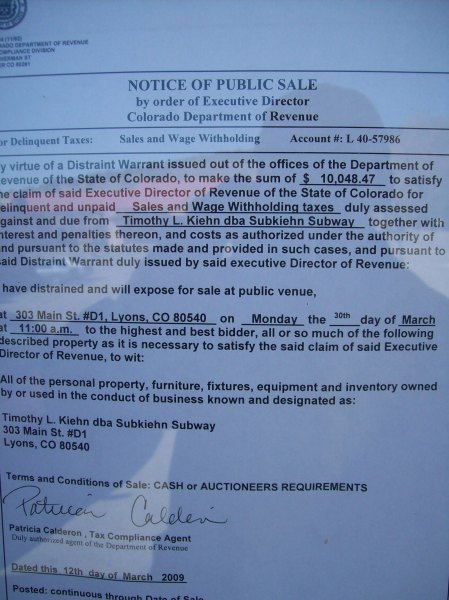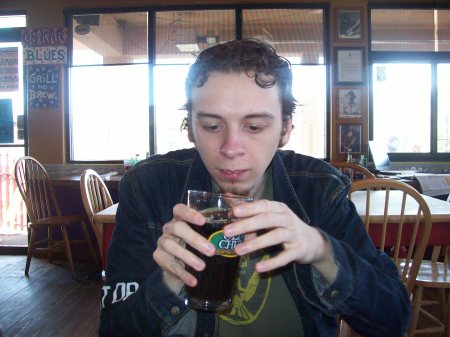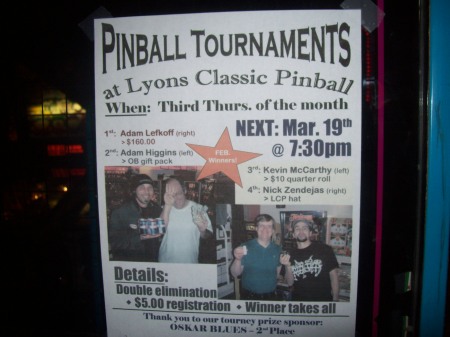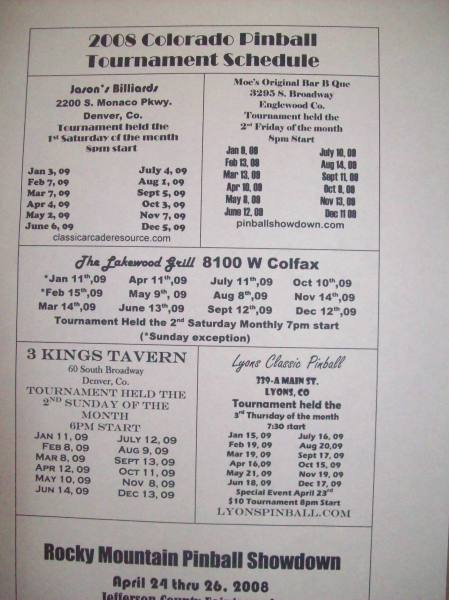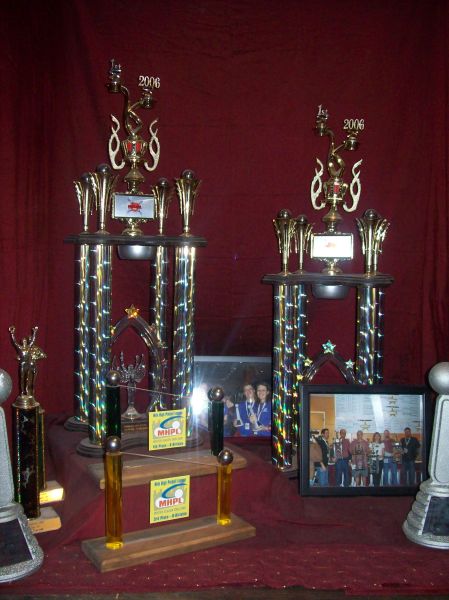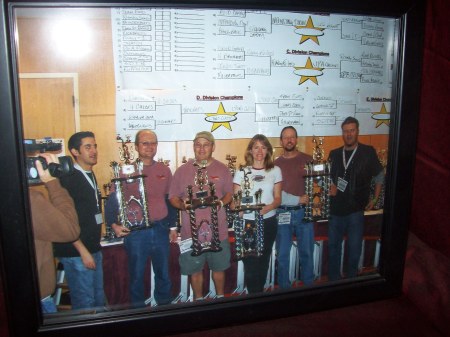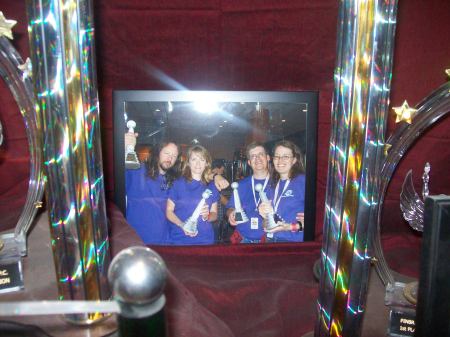So I guess I’ve waited long enough for our furry friend and will have to give my final proclamations about MGD3 independently of his watchful eye. Hopefully this won’t permanently bias my perception, but if it does then that’s cool too, I guess. He probably would have just docked it for having too much heterosexual furry sex anyways.
So the past year, and even the past month specifically, have seen some interesting developments in the world of music games. Pump Pro was released, Mungyodance 3 yiffed its way into existence, ITG Rebirth finally came together, and WinDEU managed to get his ass onto the development team for all three, somehow. I’m going to talk about a lot of things in this article. Maybe even too many. In the meantime though, let me give you a brief assessment of all three.
Pump Pro is my favorite of the three, and not just because I’m the best in my state at it. It addressed a major problem I had with other Pump games by replacing their combo based scoring system with an accuracy based scoring system and marginally stricter timing windows. The result is something like a cross between classic Pump and ITG; which of course means that most competitive Pump players hate it because they can’t time and have developed their style of play entirely around comboing things, and most DDR players hate it because it has strict timing, 16th runs, and very complex crossovers. ITG players are split; some of them hate it just because of the extra panel, some because it reminds them that ITG is dead.
It should make sense that Pro is reminescent of ITG because it was designed and developed by the same people, operating in conjunction with Andamiro as they have been historically known to do in an effort to screw over Konami. Pro runs on the 4.0 build of Stepmania built into either a dedicab, or sold as an upgrade for existing Pump cabinets. Some people still have hangups about Stepmania based arcade rhythm games in general. This is something I’ll get to later.
Pro is great because it has, well, strict timing, 16th runs, and very complex crossovers. It’s something new to conquer, and its conventions, though not universal throughout the game, are rule based. That’s good to see, on a certain level (maybe not a competitive level; we’ll get to that). It basically means that shuffling every chart in the game would force a completely different style of play than simply playing the charts as given, which isn’t the case for some music games. Techniques are pretty much implicit in the charts, and hence a good chart can be discerned from a not-so-good one just by the methods that the player is forced or otherwise persuaded to use in order to play it or play it well. What I’m basically saying is that a bad chart is one that deviates from the established rules of composition without establishing any new, reasonable ones. Pro follows pretty uniform rules with its stepcharts.
Of course, this might also be a sign of the infancy of 5 panel games, but this isn’t that big of a problem for me, and I’ll get to this in a bit.
MUNGYODANCE 3. Well, I suppose the two things that immediately spring to mind are the major aspects of the game, the steps and the gameplay mechanics, and the third thing that springs to mind is how the release of a stepmania pack of all the songs in the game makes the second thing that sprung to mind not so important anymore. So let me talk about the second thing first, that way I’ve said something about it before it (rightfully) fades from memory.
Mungyodance 3 is also built on Stepmania, although they opted to remove timing altogether. Why, I’ll never know, but MGD3 is strictly combo based. Unlike classic pump, it doesn’t even have timing categories. In that sense it might be said to share more in common with Guitar Hero or Rock Band than any traditional dance game, but the timing windows actually seem looser, and there is quite a bit less complexity possible with 4 panels as opposed to with any instrument you would find in either aforementioned game (except perhaps vocals, lulz). Additionally, instead of a lifebar there is a numeric life system which deducts 1 life for every NC and adds one for both every 50 step combo and every freeze held. This system is very questionably conceived, for a very simple reason: both placement of and quantity of freezes per chart is not a uniform factor. As a hilarious result, there are charts where a plethora of freezes will shoot you up to 100 life and you can literally walk off the pad after playing 2/3rds of the song. I don’t know if anyone has noticed this or done this, or even if anyone would want to, but within the context of the game mechanics it is strictly speaking a possibility.
As to the charts themselves, after having played all the new content in MGD3 and most of the stuff from 1 and 2, this is my assessment. There are a number of very traditional stepcharts, which use steps sparingly, mostly in the the 4th and 8th denominations, turn selectively, leave downtime between streams, etc. Most of these are solid. Then there are very eccentric stepcharts; these aren’t just limited to expirimentals, mind you, although those are the most self-conscious and so I appreciate a lot of them better. This includes joke files like the Dash Hopes series (the Another for Dash Hopes 3 is outstanding, btw). It also includes stepcharts that use gimmicks like a constant BPM shift to force an artificial wave (not a new technique, for those of you who have really been paying attention to stepchartistry over the years), and that have step patterns which force highly sophisticated and hence uncommon techniques, like triples and quads placed in streams. These are going to be harder for your average player to enjoy.
There is one other special thing about MGD3 worth noting. Mines have been replaced with “mod-bombs”. These are a unique if somewhat eccentric addition. They don’t actually subtract from health. In some charts, such as Nobody Likes the Records, I get the impression a mod bomb is actually intended to be hit as part of the song. Naturally in the SM version these are replaced by actual mines, so they lose a little bit of something. Probably not enough to cry over though.
However, there are also charts which include triples and quads and hands and such while being pretty bland in general. I’m afraid this actually constitutes many of the charts. I think the people that stepped MGD3 might have been suffering from collective A.D.D. because probably 80% of the charts are stepped purely and entirely to the most active song element of any given part of a song, with little to no downtime between streams. So the bassline will be 8th notes at the beginning of the song, and the steps will go to it, then vocals and synth will kick in. If the synth is just a humming it will be ignored and the vocals will be stepped, if the synth is a 16th rhythm the steps will favor that, even if it’s 50% softer than every other song element and hence harder to actually focus on. The Drum and Bass folder is very generic on the whole.
Now let me just say, that I don’t think that’s even necessarily a bad way to step something. In fact my tastes are ridiculously simple with stepcharts typically, to the point they might even seem hypocritical in light of other opinions of mine. If I get in an argument about music and someone says that Schoenberg is great because 12-tonal is a brilliant way of blah-blah-blah, I tell them I don’t think dissonance constitutes a music style and to take their dodecaphony and shove it. With stepcharts, I’ll pretty much defend anything as long as the artist seemed to have an intention behind what they were doing, even if it was a terrible one. I mean hell, I made stuff like this because I thought it was funny. And while it is true that I’m a horrible person (and we’ll get to that later), I’m actually starting to think I’m more consistent than I realized. A joke is funny once, and maybe hysterical twice, but stretch it on forever and it wears thin. There were too damn many stepcharts in MGD3, and most of them weren’t novel or entertaining. The steps didn’t do anything for me that the music wouldn’t have done by itself, and most of them reminded me of each other. The exceptions were great, but they kind of drowned in all the content; I’ll take a Timebomb or a The Big Orange Love over Cutie Chaser Morning Mix or a Baby Baby Give Me Your Love, but if you ask me to name as many songs as I could from the game I probably wouldn’t get to 30. Out of 300+, that’s kind of not a lot.
If you want to play something from MGD, just download the stepmania pack, find the stuff you like, and delete the rest. To give you a head start, the in-house music can be pretty safely ignored. The IDM folder has in my opinion the best ratio of hits to misses, although there are some pretty big misses.
Alright, ITG Rebirth. This was extremely solid. As you should either know or be able to tell, it’s a fan project designed to make a song pack to play in Stepmania, and on R21 machines, in the vein of the ITG series. In that capacity, it’s somewhat mixed. On the whole it is much more crossover heavy than ITG ever was. I don’t have a problem with this, but I’m sure there are people already whining because people tend to enjoy that. ITG rebirth actually makes a mistake that MGD3 didn’t, in that it has a number of charts which start before the customary measure or two of song time to give the player an idea of what they will be doing. This is easier to look past, though, because even with that little unconvention, most of the offending charts aren’t terrible, and the ratio of hits to misses is still pretty good (although it has much less content than MGD3. On that note it’s pretty impressive that I can’t remember any charts from MGD3 that did that; or it’s a sign of how unmemorable the game was). I think there is like, one 14 footer in the pack, and maybe a handful of things harder than 12. So the distribution of difficulty follows the pyramid structure, just like ITG did, although the myths about the game seem to be growing exponentially to the point that I one day expect it to be common knowledge that every ITG chart had 64th rhythms at 200+ BPM.
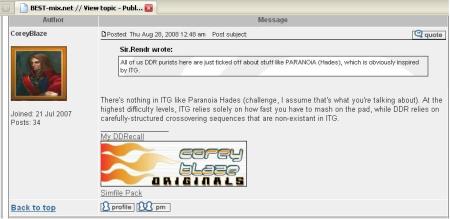
Two experts discussing ITG
The steps are generally very ITG like in terms of rhythm and overall structure. 16ths will be used to complement certain elements of a song and not others (depending on difficulty at least) so that there is a diversity of patterns and the structure of the stepchart isn’t perfectly symmetrical with the structure of the song. They seemed to have been constructed with an idea of their performance in mind, which as I said, is something I can appreciate. Now that I think about it, it seems like MGD3 is the game that the overwhelming number of DDR players seem to think ITG was; gimmick heavy and hyperactive, which makes its popularity all the more confusing and appalling to me. Blame the lack of timing windows? I don’t know.
Rebirth is sound. There are some gimmicks, but they can be appreciated as all of them are there for a reason. They attempt to force novel techniques. There doesn’t even seem to be any forced heel-toeing in Rebirth, as distinct from Mungyodance. There are charts which heel-toeing would dominate, but it isn’t necessary to pass anything. My only real problem with Rebirth were most of the things dragon (and Draigun) related. Blame the furries? Hell Yeah.
So that’s all that Jazz. Now for the issues of Stepmania, 5 panel, and my epic degree of elitism.
OK, so most people remember that dance and music games started out with big companies and proprietary tech and hardware systems, even if they started playing DDR Extreme and not DDR 1st mix like a proper 16th hating 200-pound DDRFREAK moderator. Of those people, most of them use and know of Stepmania as a simulator. So the idea is that Stepmania is an imitation of DDR (and of Pump, and all the other game types it came to support), and a lot of people can’t get that out of their head. It didn’t go away when 600,000 bajillion fan charts got uploaded to Bemanistyle, or when Arch0wl and friends first started making “keyboard” specific files. It sure as hell didn’t go away when ITG came out running on Stepmania. Pretty much nothing that followed from that ever made it go away, and it probably never will.
What I think these people are missing is an organic sense of these games. DDR 3rd mix ran on different hardware than DDR MAX, had different gameplay mechanics, a different framerate, and even a different scoring system. Still, no one questions the legitimacy of DDR Max as a progression from DDR 3rd mix. When it comes right down to it, Stepmania does the same damn thing as proprietary DDR software. It makes 4 arrows scroll up a god damn screen in time to god damn music until some god damn input is received which registers a given value in relation to time, culminating in an aggregate total value after all the motherfucking arrows are gone or halting when some sentinal value has been reached; 30 miss combo, no life left, whatever. The mechanics are slightly different, and even modifiable, but it’s still a perfectly legitimate 4 panel game irrespective of everything else.
Same damn thing when it runs a 5 panel game.
I don’t expect people to ever get over this. There are still people who refuse to use speed modifiers or the bar, based on some weird pseudo-philosophy or dance game machismo, and hey; that works for some of them better than good form works for other people, but something like this is just silly. It’s anti-growth, in my opinion. If people really think of stepcharts as a legitimate form of art (are they, even? I guess maybe), it shouldn’t matter what hardware or software they run on just like whether a piece of music is played on a grand piano or a keyboard doesn’t really have much bearing on the music. Similarly, if people think the performance of stepcharts can constitute some form of athleticism, it also shouldn’t matter, just as a baseball game played on Coors Field or Wrigley Field is still a baseball game. Yes, there are substantive distinctions, like how does altitude affect performance, how do the recessed panels of a DDR machine make runs harder than the panels of an ITG machine, etc, but that’s mostly dressing and of little ultimate concern.
As to 5 panel. Earlier I said that it may be in its infancy. Now, let me clarify that, because I’m sure it has a lot of people going “WTF”, as it were. Now, DDR had been around for a long time before ITG came out, but what kinds of innovations did it really create in that segment of its life? It created freezes and “boss songs”, and fleshed out most variants of crossover and double step. These are substantive things, and should not be neglected. ITG, however, fleshed out the use of 16ths, pushed the envelope on difficulty, and innovated the use of mines and hands in charts. It also created freeze rolls, which as used in ITG are almost entirely inconsequential and redundant. The only place they really see novel use is in fan charts; Welcome to Rainbow and Tricky Disco spring to mind. In addition to these things, however, ITG forced the development of full minimalist styles of play, heel-toeing and future, which went on to revolutionize 4 panel competitive play. There are two types of people that win ITG tournaments, people that do heel-toe or future, and people that can heel-toe or future. It’s very significant.
Do you remember at the very beginning of the article when I said that playing Pump charts on shuffle would result in a different playing style than playing them regularly? Maybe if you have a really long memory, because I certainly wrote a large number of words here. Anyways, now is when I can explain the full significance of that. A truly skilled 4 panel player can pass any song on random, and they can outperform a less skilled player at the task just as easily as if it hadn’t been . DukAmok picked Summer Random on Blake at the 2008 US ITG OPEN (note: Blake has the most highly skilled future technique in the world, and is #1 on Groovestats. Only his tournament consistency is in question) and won by that method.
5 panel, not so much. What this means is quite simply that 5 panel games have not had a fully minimal, effective style developed for them yet. This might mean such a style doesn’t exist, but it also might mean the nature of stepcharts, or of the competitive community, simply hasn’t forced it yet. Sorry Jboy, I think the future might yet favor sliding, or something similar to it; although by remaining competitive with a no-bar style you might also be demonstrating something unique about 5 panel games. Heaven knows I haven’t been able to put my finger on it yet. Maybe history will give us our explanation.
At any rate, there are games like IIDX, which require technique which isn’t fully and uniquely implicit in the patterns of the game. Then there are games like ITG, where such technique isn’t required, but the ability to perform it, or at least have the tools necessary to perform it running in the background while you play the normal way, just in case, will determine the outcome of high level competitions. 5 panel is neither of these at the moment, and it that sense it may have a bit of room left to grow. That’s all I meant.
What a convenient segway into the subject of my elitism! Which is probably the worst way to end an article about games in the history of ever, but I wrote all these damn words so too bad! As I was telling MC Burgertime, I’m pretty sure I’m the OFFICIAL SUPERVILLIAN of the bemani community, what with being banned from forums and accosted by moderators more times than any living person, and having the somewhat eccentric notion that pretentiousness and second-guessing are the two most virtuous things in the world. They are of course. Second guessing is how you get something right when you were wrong about it the first time, which helps with the whole being right about things thing, and pretentiousness is the enlightened person’s way of showing they care about things. There’s another reason I’ve been making a habit of being a dick lately though, and it’s not the same reason I argue (I just gave that reason, although people in general will just take these two things as inextricably related and be done with it, it seems). It’s the most effective way I have of convincing people to do things.
Now, I learned this from Michael Rosenthal, although I don’t know if he was doing it self-consciously or not. If not then, well, LOL, but anyways what I learned is this. People tend to get satisfied and complacent with their performance well before it becomes anything really noteworthy, so you can’t appeal directly to their desire to be happy with themselves. Making them unhappy with themselves is also a sketchy approach at best. However, if you go out of your way to try and make people unhappy with themselves, what happens is that they become unhappy with you instead. This is a kickass motivation. Nobody likes a loud, arrogant, grandstanding disgusting person, and they certainly don’t like thinking they can’t beat them at something. So, as someone who was already universally considered loud, arrogant, and disgusting, all I have to do is some grandstanding to make people unhappy with me and BAM! Motivation. I would have preferred the other way, personally, but like I said, OFFICIAL BEMANI SUPERVILLIAN and all. It’s not like I chose the title for myself, I had the mantle thrust upon me, but I guess I’ll just go ahead and run with it.

Kev tells it like it is
Besides which, I’m not even that good at things, which will make the triumph of good versus evil that much easier to obtain. Plus I have all these legitimate character motivations which I can pretend to draw on, even though I’m actually too disciplined for my brain to work that way except when I’m acting, like my intense hatred of excuses and of people blaming their body for things, driven by my secret womanhood, and my intense hatred of people who let themselves feel entrapped and impotent by things they can actually change, driven by my unchangeable manhood, and my self-hating ways, driven by my hatred of myself, and my ability to say things that are completely 100% true in a way that people think I’m lying, driven by the fact I took acting classes but also by the fact I’ve lived the role of a man my entire life and come to understand that no one can actually discern jack shit about other people’s innermost character. Oh, and Mazo, somehow.
Besides which, since when did telling people things that they already knew about themselves become offensive? Steve is old and Jason is large? lololol. I don’t even have to do anything particularly villainous, I just have to twirl my mustache while being mundane and apparently it’s enough.
So yeah, I wouldn’t do it, but when I go to play at Boondocks the day after I piss everyone off to see that I’m still no match for Blue, or that Bossycow came and took one of my scores, it makes me ecstatic. I take it right back of course, and maybe there is some truth in the eternal platitude that jackasses like me make the game less enjoyable, but I don’t think so, otherwise you wouldn’t have come in looking to beat me down. When you can actually do it then maybe you’ll have earned something for once in your life.

